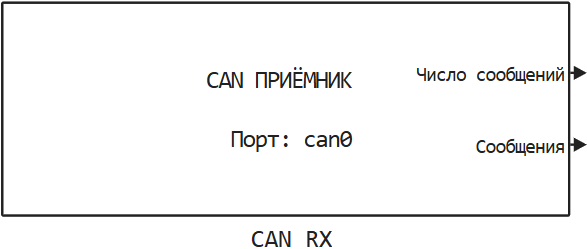CAN RX
It is used for receiving CAN messages.
blockType: EngeeFunction
|
Path in the library: |
Description
| To work with the block, install/update the support package. equipment. |
Block CAN RX It is used for receiving CAN messages.
Message filter in the CAN RX block
The length of the identifier of the received CAN message can be 29 bits (for the extended frame format) or 11 bits (for the standard frame format). The CAN message passes through the filter and is accepted only if all the bits of the identifier have passed through the filter. If at least one bit of the message identifier has not passed through the filter, the message is discarded. Settings Filter ID: and Mask: allows you to set a filter based on individual bits of the identifier of the received CAN message.
The message passes through the filter if the following condition is met:
CAN ID & Mask == Filter ID & Mask,where CAN ID is the identifier of the received CAN message.
- In other words, the filter can be represented in the form of the following rules
-
-
If the value is Mask: If an individual bit is zero, then this bit is not filtered. That is, this bit is not checked in the filter and passes through the filter.
-
If the value is Mask: for a single bit, it is equal to one, then filtering is performed by the value of this bit.:
-
If the bit is from the CAN ID and the bit is from Filter ID: If they match, then this bit passes through the filter.
-
If the bit is from the CAN ID and the bit is from Filter ID: if they differ, then this bit does not pass through the filter.
-
-
Example of the filter operation:
Let the following message filter be set.:
FilterID = 0b0100;
Mask = 0b0110;Messages with CAN identifiers 0x4, 0x5 and 0xC pass through the filter and are accepted:
CAN_ID = [0b0100 0b0101 0b1100];
can_msg_passed = bitand(CAN_ID, Mask) == bitand(FilterID, Mask)
can_msg_passed =
1×3 logical array
1 1 1Messages with CAN identifiers 0x1, 0x2 and 0x6 they do not pass through the filter and are discarded:
CAN_ID = [0b0001 0b0010 0b0110];
can_msg_passed = bitand(CAN_ID, Mask) == bitand(FilterID, Mask)
can_msg_passed =
1×3 logical array
0 0 0Ports
Output
#
Number of messages
—
number of messages received
scalar
Details
No more than the parameter value Число сообщений:. If there are more messages in the operating system buffer, they will be passed to the model during the next calculation step.
| Data types |
|
| Complex numbers support |
No |
#
Messages
—
array of received messages of the CAN_MESSAGE_BUS type
vector
Details
| Data types |
|
| Complex numbers support |
No |
Parameters
Main group
# Port: — CAN port for receiving messages
Details
| Default value |
|
| Program usage name |
|
| Tunable |
No |
| Evaluatable |
Yes |
# Число сообщений: — the maximum number of messages transferred from the operating system buffer to the model in 1 calculation step
Details
| Default value |
|
| Program usage name |
|
| Tunable |
No |
| Evaluatable |
Yes |
# Filter ID: — filter received messages at the OS level
Details
To disable the filter and receive all messages, set Filter ID: and Mask: how 0. A detailed description of the filter’s operation is given in the Message filter in the CAN RX block section.
| Default value |
|
| Program usage name |
|
| Tunable |
No |
| Evaluatable |
Yes |
# Mask: — filter mask for received messages at the OS level
Details
The filter mask determines which bits of the CAN identifier are involved in checking when filtering received messages.:
-
If the value of the mask bit is
0, then the corresponding bit of the identifier is not checked and is considered passing through the filter. -
If the value of the mask bit is
1, then the bit of the CAN message identifier is compared with the corresponding bit Filter ID:. If the values do not match, the message is discarded.
To disable the filter and receive all messages, set Filter ID: and Mask: how 0. A detailed description of the filter’s operation is given in the Message filter in the CAN RX block section.
| Default value |
|
| Program usage name |
|
| Tunable |
No |
| Evaluatable |
Yes |
# Потоковое получение данных: — description missing
Details
description missing
| Default value |
|
| Program usage name |
|
| Tunable |
No |
| Evaluatable |
Yes |
# Шаг расчёта, с: — calculation step for receiving CAN messages
Details
The calculation step is in seconds for receiving CAN messages in the real-time application.
| Default value |
|
| Program usage name |
|
| Tunable |
No |
| Evaluatable |
Yes |
